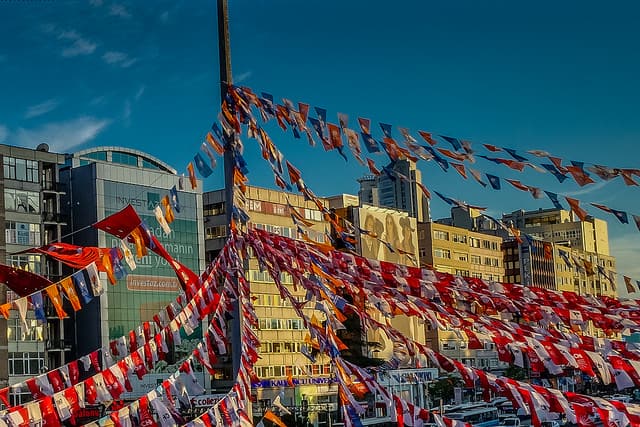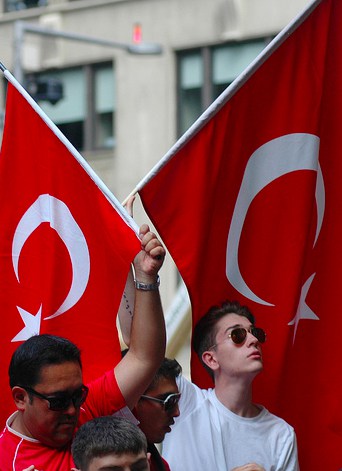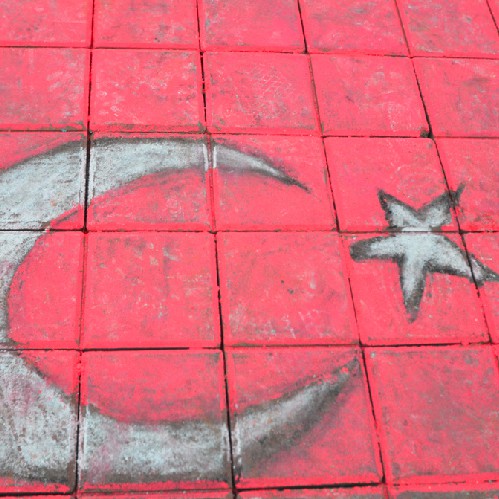On January 19 we posted on our website this petition as a form of support to Turkish academics. We have then asked a Turkish scholar – who prefers to remain anonymous – to comment both the petition and the current situation in Turkey. Her/his reply complicates the picture and suggests crucial elements for further discussions.
What is happening in Turkey is an intellectual massacre; but this is not the first time that it is happening nor is this only affecting the university professors. I think you already know that there are currently tens of journalists in the prisons including the internationally well-known ones like Can Dündar. The roots of this can be traced back to the 1980 military coup that was not secular in its nature as believed by the international observers, but rather aimed to strengthen the neo/liberal (happened to be conservative/Islamist) circles, ideologies and parties in the country as bulwark against and alternative to the ideological polarization between the Turkish right and left.

During the course of the 1990s, there was a brutal intellectual massacre targeting secular, Kemalist and left-leaning scholars, activists and journalists: assassinations by perpetrators unknown that not even a single one of them has been solved. Well, today is the continuation of yesterday to finalize the grand project that our NATO supported Islamists (See Cihan Tugal’s article, “NATO’s Islamists”) had always in mind: Regime Change. In the 1990s, perpetrators of extrajudicial activities were affiliated with this mysterious underground establishment that we called “the deep state” and unknown; today they are not underground, or unknown. Belma Akcura, Turkish journalist, wrote a book about the deep state a few years ago and picked a title for her book summarizing the situation since then: “The Deep State has Become the State”. In the 1990s, public figures associated with the secular-left would be targeted individually, today there is a mass extermination and pacification of all groups identified as oppositional to the institutional destruction and the regime change. In the 1990s, Kurdish villages were evacuated forcibly, today Kurdish city centers are being evacuated…
I am very concerned that these individuals who signed the original declaration are now under spotlight and their cause is supported by a variety of internationally prominent figures including Noam Chomsky and Joe Biden, and cursed by notorious ultra-nationalists/fascists who can easily use their underground networks to assassin any one of these scholars. I do not think that you can imagine what is happening in Turkey, even we do not know exactly what is going on due to media censorship and disinformation.
I see it as a regime change; it will happen regardless of social opposition and international criticism, and will continue until our umbilical cord is broken as a society.
We had the most controversial elections of the Turkish history under emergency rule circumstances with all oppositional political parties silenced and unable to run their electoral campaigns last November 2015. This happened after June 2015 regular elections that showed a drastic decline in the AKP’s votes and required the formation of a coalition government.

While the opposition parties were unable to figure out how to form a coalition government without the AKP, the actors of the regime change used every way possible, including violence to manipulate the public for a re-election in November. They were so successful in their plans that even the AKP members couldn’t believe the unprecedented amount of votes that they received in the re-elections. The leader of the main opposition party congratulated the AKP after the unbelievable AKP success in the November re-elections.
We have misguided citizenry, hopeless opposition and oppositional leaders with twisted minds in this country.
No matter how oppressed, repressed, silenced, abused, humiliated we are, we still have the illusion that we live in a democracy, therefore should accept the election results, right! And our imagination has no boundaries that our underappreciated, underpaid, overworked university professors with support of their foreign fellows even think that they can make change through signature campaigns!
I personally think that the recent international criticism is making the actors of the regime change more ruthless towards the dissidents.
There cannot be anything easier than putting their names on that signature campaign for established American scholars like Chomsky, Harvey, Butler, Wallerstein and Turkish American scholars working in the universities in the US. It is a noble act of protest against what we all know that is happening in southeastern Turkey. However, for Turkish university professors operating in an environment where they have no intellectual freedom, no job security, no life security and unfortunately no legitimacy in the eyes of the mainstream society due to the gap between the world of Turkish academia and Turkish society, it means risking everything they have: their name, job, family, future, even life.
Also, even though the Turkish security forces are mainly responsible for the physical destruction and civilian casualties, this is a mess that the actors of the regime change and the PKK have created together in southeastern Turkey. The PKK has done a great damage to the HDP, the legal representative of the Kurds in Turkey, especially with its stubborn as well as ambiguous stance during the events between the last two elections. Until recent times with its political discourse embracing the entire country, the HDP was increasingly popular especially among the left-leaning Turkish youth.

The PKK is an armed organization with its own survival reflexes and political agenda, and until recently had no reason to exist anymore given the presence of the HDP in the parliament and growing constituency of this party all across Turkey. The HDP leaders said this numerous times in their public speeches. What is described in the anti-government letter is not surprising to someone who is slightly familiar with the history of southeastern Turkey: when there is resistance, the army crashes it together with everything around it. However, there is a lot more complex situation in the region today than there was in the 1990s. Back then, the armed fighting between the Turkish army and the PKK was contained in the rural and the mountains, and there wasn’t such a large scale internationally organized conflict in the Middle East. PKK’s resistance is now carried out in the city centers and inner city neighborhoods, indicating that they have been arming their bases in certain provinces during the so-called peace negotiations with the AKP. With the recent escalation of violence in southeastern Turkey, the PKK is reclaiming its traditional role; changing its position from an organization that was allegedly ready to lay arms to pass the responsibility on to the party politics to the sole protector of the suffering Kurdish citizens in the region undermining the efforts of the HDP to remain in the Turkish parliament.

Does this have anything to do with the self-confidence boosted by the international praise and support that the PKK affiliated militias in Syria and Iraq received because of their fight against ISIS? Under normal circumstances, independent scholars must ask questions about the motivations of the PKK, what kind of agenda this organization has and its expectations from the Kurds of Turkey and the HDP. The anti-government letter signed by the scholar was very limited in terms of its articulations of the complexity of the situation in Turkey. However, we live in extraordinary circumstances where there is media censorship, no access to the conflict areas, civilians being killed and displaced, but also Turkish soldiers who are predominately from the poorest families of this country are fallen in a war that they believe for the mother nation. Letters of signature campaigns are usually addressed to legitimate political actors like states, not internationally recognized terrorist organizations like the PKK, as one scholar who signed the letter indicated in response to a Turkish newspaper when the police was going after the signers of the letter and detaining some of them. Under normal circumstances, we could discuss this and everything else in academic forums as well as in front of the public without having police or mafia on the back of our necks.
Not surprisingly, a thousand university professors (likely to be sympathizers of the AKP and the nationalist MHP in highly politicized Turkish universities), in another signature campaign announced their support for the government and the army accusing their colleagues who signed the anti-government declaration for being PKK sympathizers and legitimizing the PKK. I am not sure about who started the first signature campaign, the Turkish scholars in Turkey or the Turkish Americans in the US?
But almost all Turkish citizens who signed that anti-government letter are now under police scrutiny, tens of them affiliated with the universities in Turkey have already lost their jobs, and a lot of them have received death threats putting their families at risk.
And what we know for sure is that the recent international support for them is automatically associated with “those foreign jackals” ready to divide Turkey and carve out an independent Kurdistan in southeastern Turkey. This is what I mean by less public sympathy and a more ruthless government attitude towards any dissident with support from foreigners. But, this happens all the time! The international community in the “free western world” looks for heroes to fight the bad guys in the rest of the world and then watch them being sacrificed, watch them suffer in the hands of the villains. But, no! More signature campaigns can be organized, and the victims can even be given one of those prizes that those in the west like to give away to the freedom fighters and human rights activists in those unfortunate undemocratic countries…
Featured image (cropped) by Daniel Arauz (flickr, CC BY-SA 2.0)





